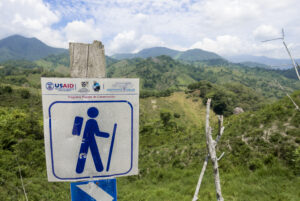Yesterday, Colombia’s ESMAD (anti-riot police) physically attacked Afro-Colombian Port Workers who were holding a strike in Buenaventura, Colombia. As a result, three male workers were gravely injured and a pregnant worker was beaten.
The workers went on strike on Tuesday after negotiations with TECSA (Terminal Especializado de Contenedores de Buenaventura S.A.), one of the companies operating in the port, failed. Strikers reported that the company was unwilling to respond positively to any of the demands of the workers despite 20 days of negotiations. The company used the negotiation to stall the workers’ protests and offer them nothing in return.
TECSA is one of the Colombian companies that have long used an indirect hiring system—contracting workers through a “temporary agency” rather than employing them directly—in what is generally perceived as an attempt to limit workers’ benefits and avoid unionization. A long-standing demand of Colombian labor rights advocates has been to overturn the indirect hiring system; the U.S.-Colombia Labor Action Plan called for an end to this system. Earlier this year, TECSA was forced to employ 110 workers directly due to political pressure pursuant to the U.S.-Colombia Labor Action Plan (LAP). Another 50 workers employed by TECSA are still denied direct contracts.
The Port Workers Union’s Buenaventura representative received death threats after visiting the U.S. last year and speaking out on the deplorable conditions faced by his colleagues. An estimated 60 percent of exports and imports that come into and leave Colombia come from this port.
At the April 2012 Summit of the Americas in Cartagena, President Obama stated that the major provisions of the U.S.-Colombia Labor Action Plan had been met, thus paving the way forward for implementation of the FTA. As this incident highlights, this pronouncement was, at best, premature; many aspects of the LAP have yet to be implemented in a meaningful way. Unfortunately, the statement also had the effect of weakening the pressure for change in the priority sectors of the Labor Action Plan—the ports being one of these priority sectors.
Since President Obama indicated there were significant improvements in application of this plan, Daniel Aguirre, a prominent sugarcane union leader who worked hard to implement a key provision of the Plan in the sugar industry, was shot dead in front of his home and other prominent members of this union were forced to flee their homes.
Yet, Daniel is not the only victim of reprisals against workers since the Plan was launched. Thus, since April 2011 when the Plan was first announced, 34 trade unionists have been killed and another 566 have received death threats. Among those recently receiving death threats are the leadership of the Port Workers Union in Buenaventura and Turbo ports. The Colombian government’s response has been wholly inadequate.
While the situation in the Buenaventura port is bad, the workers in the Turbo port also experience abuse. WOLA visited the workers in Turbo on July 28, 2012. This visit revealed that more than 70 port workers have been fired since late 2011 for affiliating themselves with the Port Union. Workers who wish to be re-hired are forced to sign letters saying they renounce union activity or do not belong to a union. Those who refuse to do so, and therefore remain without employment, are condemned to absolute poverty since there are few alternative employment options available for these workers in this region. Among those fired are persons who worked for over 20 and 30 years in the port and who have at least five family members depending on their salary.
While the Ministry of Labor stated to U.S. NGOs in a visit to the U.S. in June 2012 that it is doing all it can to assist port workers in obtaining direct contracts and respect for their unions, these recent actions reveal that significant employer resistance continues, and that both the U.S. and Colombian governments will need to do more to ensure that employers comply with the LAP.
As the reports from Turbo suggest, despite the commitments of the Labor Action Plan, working conditions for Afro-Colombian workers remain especially abysmal, with companies which employ Afro-Colombian labor refusing to accept any trade union activity and discriminating against workers involved in organizing. In addition to anti-union hostility, we fear that such ill treatment is motivated by long-standing racial prejudice against Afrodescendents (and we note that an action plan to—eradicate racist practices against Afro-Colombians by the US and Colombia also exists and appears to have as many implementation problems as the labor plan.)
The violent actions undertaken by Colombia’s anti-riot police against workers striking over issues included in the U.S.-Colombia Plan must be immediately investigated and the perpetrators brought to justice.
On Saturday, negotiations between the Port Workers Union and TECSA are set to begin again. Labor Minister Rafael Pardo and U.S. Embassy representatives should go to Buenaventura and signal support for these negotiations and for a peaceful resolution that complies with the terms of the U.S.-Colombia Labor Action Plan. The U.S. Congress, U.S. Department of Labor, U.S. Trade Representative, U.S. State Department and U.S. labor and civil society groups should engage President Juan Manuel Santos, the Labor Ministry, the Port Association of Buenaventura and TECSA and urge them to guarantee that port workers are protected from harm, death threats, and attacks investigated and that employers negotiate in good faith over their legitimate demands.
For further information please contact:
Gimena Sanchez
WOLA Senior Associate for the Andes
gsanchez@wola.org
(202) 797-2171
Dan Kovalik
Assistant General Counsel, United Steelworkers
dkovalik@uswa.org
(412) 562-2518

